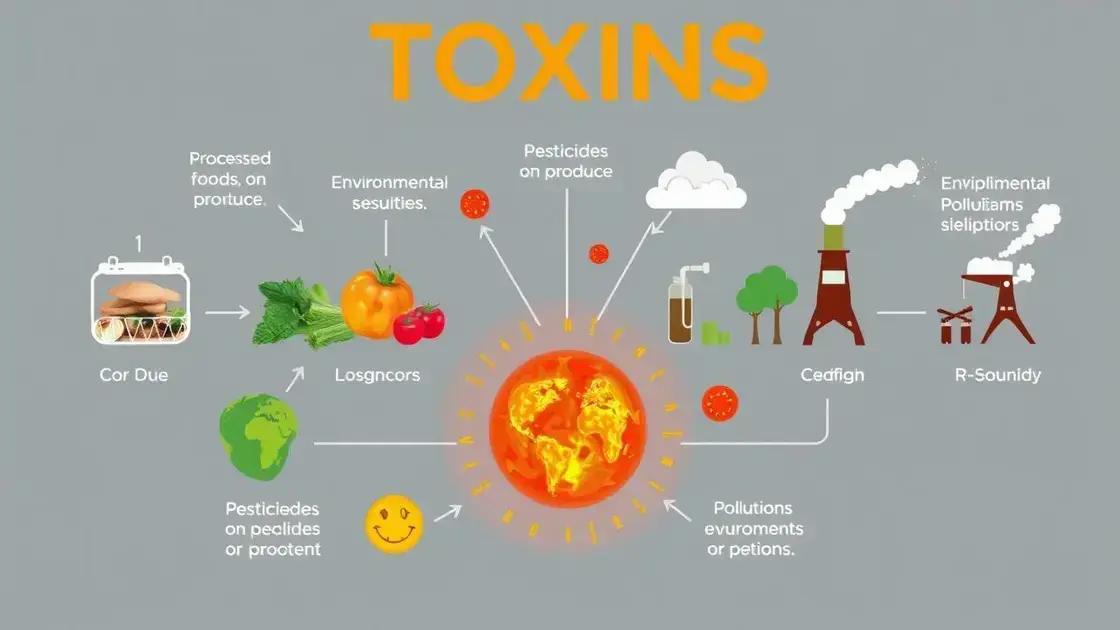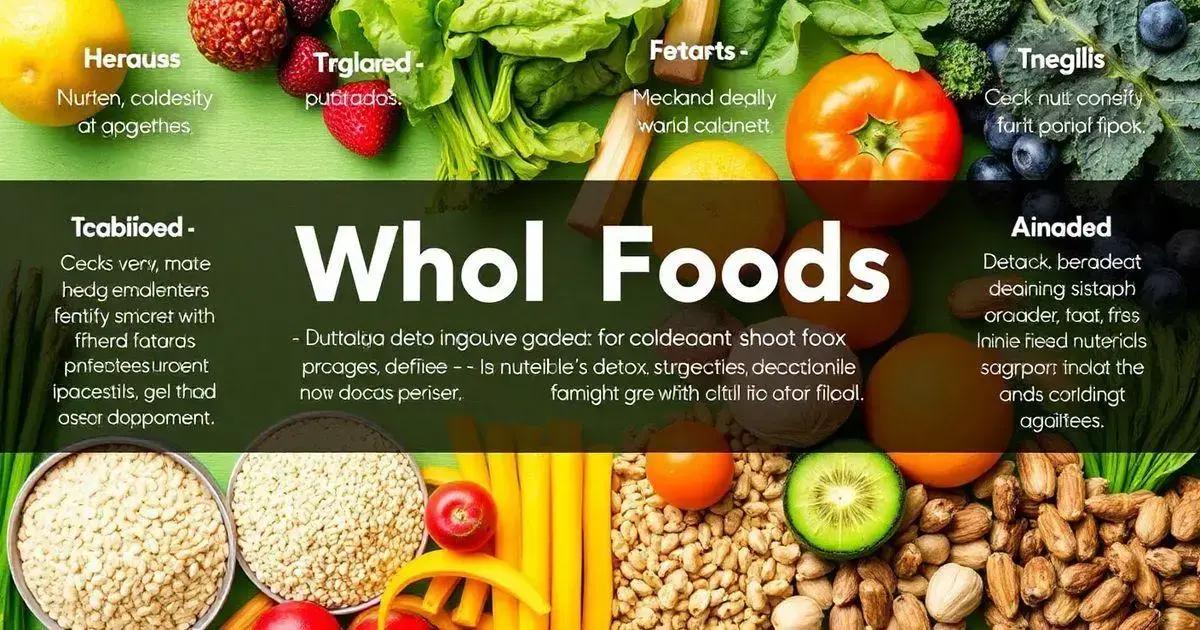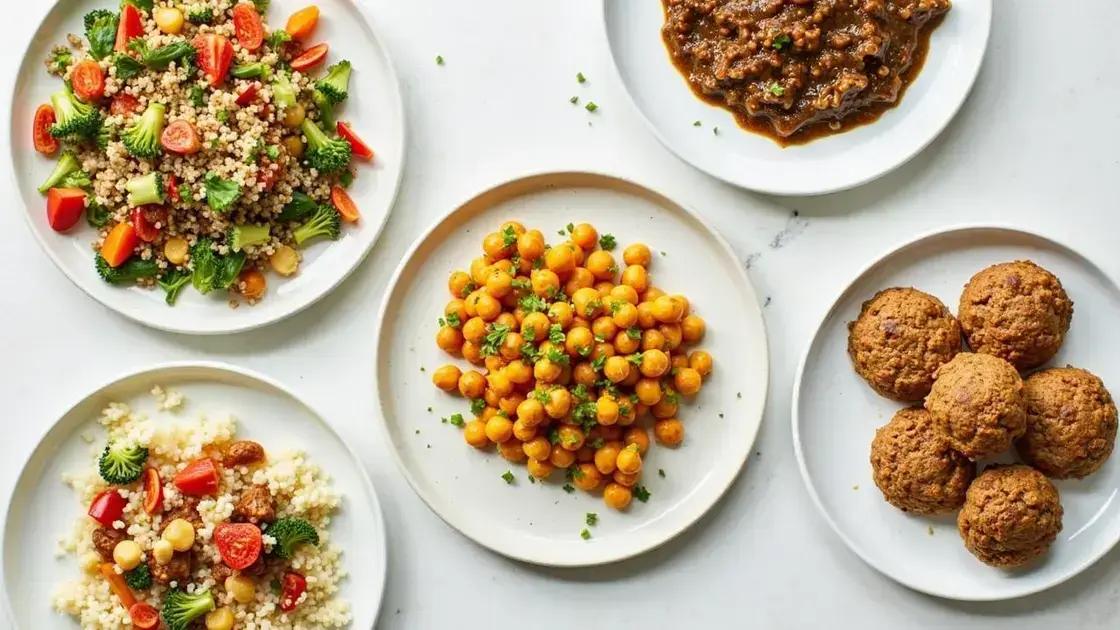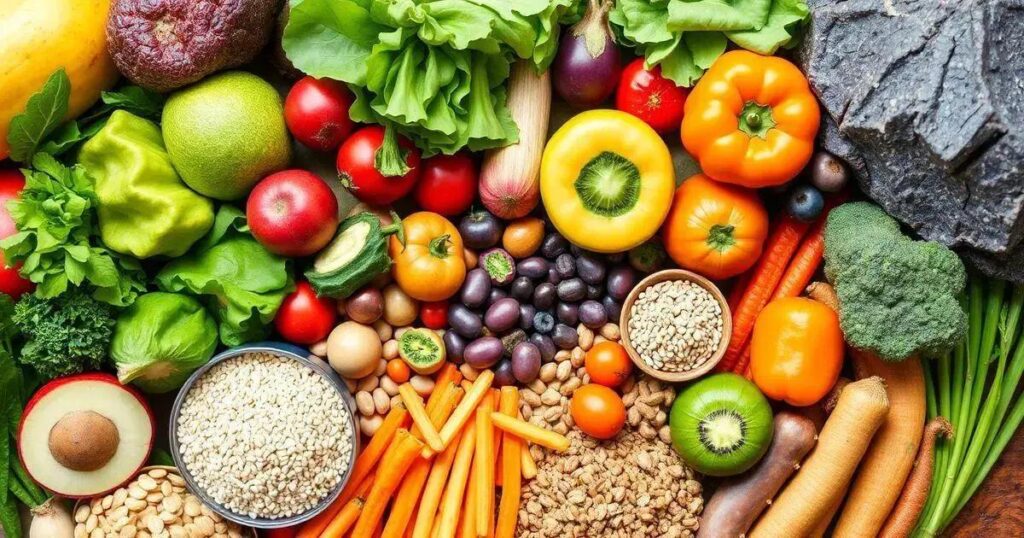To reduce toxins in your diet with whole foods, focus on incorporating natural, unprocessed foods like fruits, vegetables, whole grains, and legumes, which provide essential nutrients and support your body’s detoxification processes. Start by replacing processed foods gradually and explore delicious recipes to make the transition enjoyable.
Reducing toxins in your diet with whole foods is a crucial step to enhance your overall health. Many consumers overlook the significant impact that everyday food choices have on their bodies. Adopting a diet rich in whole foods not only promotes wellness but also helps in minimizing harmful substances that can contribute to various health issues. This article explores how you can seamlessly integrate whole foods into your daily meals, the benefits of reducing toxins, and will provide you with some delicious recipes to get started.
Understanding Toxins and Their Impact on Health

Toxins are harmful substances that can come from various sources, including the environment, our food, and even our bodies. Understanding toxins and their impact on health is vital to making better dietary choices. They can affect our immune system, disrupt hormones, and contribute to chronic diseases.
Sources of Toxins
Toxins can enter your body through contaminated food and water, environmental pollution, or even certain household products. Pesticides on conventional fruits and vegetables, additives in processed foods, and chemicals in packaging can expose you to these harmful substances.
How Toxins Affect Health
When toxins accumulate in the body, they can lead to negative health effects. For example, they may cause headaches, fatigue, digestive issues, and even long-term conditions like cancer or organ damage. Reducing your toxin intake is essential for improving overall health and well-being.
The Role of Nutrition
Your diet plays a significant role in how your body processes and eliminates toxins. Consuming whole foods, which are nutrient-dense and free from harmful additives, can help the body detoxify naturally. Incorporating foods rich in antioxidants and fiber supports your body’s detox processes.
By understanding the sources and effects of toxins, you can take proactive steps to minimize their impact on your health. Transitioning to a diet consisting mainly of whole foods is an effective strategy to reduce toxin exposure and improve your overall health.
Benefits of Whole Foods in Detoxification

Whole foods play a significant role in detoxification. They are natural and unprocessed, making them nutritious and beneficial for the body. Eating whole foods helps your body eliminate toxins efficiently.
Nutrient Density
Whole foods are packed with vitamins, minerals, and antioxidants. These nutrients support your body’s natural detox systems. For example, leafy greens like spinach and kale are high in fiber, which aids in digestion and helps remove waste.
Hydration
Many whole foods, like fruits and vegetables, have high water content. Staying hydrated is crucial for detoxification. Foods like cucumbers, watermelon, and oranges help maintain hydration while providing essential nutrients.
Anti-Inflammatory Properties
Whole foods contain natural compounds that can reduce inflammation in the body. This is important because chronic inflammation can lead to various health issues. Foods like berries, fatty fish, and nuts are known for their anti-inflammatory benefits, assisting your body in the detox process.
Supports Liver Function
The liver is the body’s main detox organ. Whole foods, particularly those rich in sulfur, like garlic and onions, can enhance liver function. They help the liver break down toxins and excrete them effectively.
Incorporating whole foods into your diet allows your body to detoxify in a healthier way, ensuring you protect and support overall health while minimizing toxin exposure.
Simple Steps to Incorporate Whole Foods

Incorporating whole foods into your diet can be easier than you think. Here are some simple steps to help you make the transition.
Start with Breakfast
Begin your day with whole foods. Switch to oatmeal or whole grain toast instead of sugary cereals. Add fresh fruits like bananas or berries for flavor and nutrients.
Shop the Perimeter
When you go grocery shopping, focus on the perimeter of the store. This is where you’ll find the freshest whole foods, like fruits, vegetables, and lean proteins. Avoid aisles with processed foods that are often high in additives.
Meal Prep
Planning and preparing your meals can help you stick to a whole food diet. Spend some time each week to cook and pack whole food meals. This makes it easier to grab healthy options when you’re busy.
Try New Recipes
Experiment with new ingredients and recipes. Discover how to make delicious dishes with whole grains, fresh vegetables, and healthy proteins. Websites and cookbooks can provide great inspiration.
Incorporating whole foods into your diet doesn’t have to be overwhelming. These simple steps can lead you to a healthier lifestyle and help you reduce toxins in your diet.
Delicious Whole Food Recipes to Try

Here are some delicious whole food recipes that you can easily try at home. These recipes are not only tasty but also help reduce toxins in your diet.
Quinoa Salad
Combine 1 cup of cooked quinoa with 1 diced cucumber, 1 cup of cherry tomatoes, and 1/4 cup of chopped parsley. Drizzle with olive oil and lemon juice for a refreshing salad.
Vegetable Stir-Fry
In a pan, heat a tablespoon of coconut oil. Add 2 cups of mixed vegetables like bell peppers, broccoli, and carrots. Stir-fry for 5-7 minutes. Season with soy sauce and serve over brown rice.
Chickpea Curry
Sauté 1 chopped onion and 2 minced garlic cloves in olive oil. Add 1 can of chickpeas, 1 can of diced tomatoes, and 2 tablespoons of curry powder. Let it simmer for 20 minutes. Serve with whole grain naan.
Banana Oatmeal Cookies
Mix 2 mashed bananas with 1 cup of rolled oats. Add dark chocolate chips or nuts if desired. Drop spoonfuls onto a baking sheet and bake at 350°F (175°C) for 15 minutes.
These recipes are simple to prepare and are packed with nutrients. Enjoy incorporating these delicious whole food meals into your diet!
Embracing Whole Foods for a Healthier You
Incorporating whole foods into your diet is a powerful way to reduce toxins and enhance your overall health. By understanding the impact of toxins, recognizing the benefits of whole foods, and adopting simple steps to include them in your meals, you pave the way for better nutrition.
Delicious whole food recipes make it enjoyable to embrace this lifestyle change. As you transition to a diet rich in natural ingredients, you will not only improve your well-being but also enjoy the delightful flavors that whole foods offer.
Remember, every small step you take towards including more whole foods in your diet contributes positively to your health journey, helping you feel more vibrant and energetic.
FAQ – Frequently Asked Questions about Reducing Toxins with Whole Foods
What are whole foods?
Whole foods are natural, unprocessed foods that are free from additives, preservatives, and other artificial ingredients. They include fruits, vegetables, whole grains, nuts, and seeds.
How do whole foods help in detoxification?
Whole foods are nutrient-dense and help support the body’s natural detox processes. They provide essential vitamins, minerals, and antioxidants that aid in eliminating toxins.
Can I replace all processed foods with whole foods at once?
It’s best to transition gradually. Start by replacing a few processed items with whole food alternatives and gradually increase your intake of whole foods over time.
Are there easy recipes for incorporating whole foods into my meals?
Yes! Simple recipes like quinoa salad, vegetable stir-fry, chickpea curry, and banana oatmeal cookies are delicious ways to include more whole foods in your diet.
How can I ensure I am reducing toxins in my diet?
Focus on eating fresh, whole foods, shopping the perimeter of the grocery store, and avoiding highly processed foods that often contain additives and preservatives.
What types of whole foods should I prioritize?
Prioritize a variety of fruits, vegetables, whole grains, legumes, nuts, and seeds to ensure you are getting a balanced and nutrient-rich diet.













